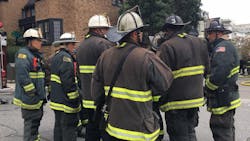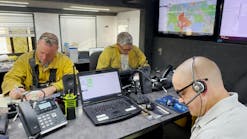San Fran FD Eyes Expanded Peer Support
By Dominic Fracassa
Source San Francisco Chronicle
July 25 -- A peer-support program meant to help San Francisco firefighters and paramedics process the stresses of their jobs could see its first major expansion in nearly two decades.
The program, often described as effective but lacking resources, is seen by many within the department as critical to helping first responders manage the lingering post-traumatic stresses that can accompany their often harrowing work.
On Wednesday, the Fire Commission is set to vote on an initiative directing Fire Chief Joanne Hayes-White to spend the next few months researching how the department can begin training more peer counselors and creating a support network that can help first responders process the mental demands of the job.
“This is an opportunity for the chief to look at this issue without boundaries and to tell us, ‘This is what a perfect unit would look like,’” said Fire Commissioner Joe Alioto Veronese, who authored the resolution. “They’re dealing with incidents that you can never unsee. This is about creating a network so that every station has someone with some sort of training to help identify issues early.”
The resolution directs Hayes-White to figure out how many “peer support managers” the department should have. Exactly how many could be needed and how much it would cost to train them remain open questions.
Currently, the Fire Department has just two full-time employees — one a paramedic, the other a firefighter — assigned to a so-called “stress unit” that serves anyone struggling to process reactions to a job where violence and death are routine. The department takes additional steps to “debrief” first responders following especially traumatic events, usually ones involving children or a large number of casualties.
“I think everybody knows how physically demanding the job is, but it’s equally emotionally demanding, and that takes a toll,” said Hayes-White, who is “fully supportive” of efforts to expand mental-health services for the city’s first responders.
A 2015 survey of more than 4,000 emergency medical technicians and paramedics conducted by the Journal of Emergency Medical Services, an industry trade publication, suggested that first responders were contemplating and attempting suicide at 10 times the rate of the general population, based on figures from the Centers for Disease Control.
Before he retired in May, John Christy spent the last six years of his three-decade career at the Fire Department leading the two-person stress unit — a moniker he has always disliked. Under Alioto Veronese’s resolution, the unit would become the “peer support unit,” so people wouldn’t be dissuaded from seeking help over concerns they’d be labeled as unfit to work.
Christy worked to get mental health “resilience training” added to the training curriculum for first responders. He applauded the effort to expand peer support at the Fire Department and praised Hayes-White for “supporting the stress unit more than any chief has done thus far. This is a part of keeping first responders healthy, so when you guys call us, we’re good to go.”
Over his years of service, the stresses of life and the job drove Christy to alcoholism, addiction and thoughts of suicide. He contemplated calling a member of the stress unit for five years, he said, before he finally stopped “calling the number and hanging up.” The effects altered the course of his life for the better, he said. The experience of working with a peer on the stress unit proved to be transformative.
“When I got to a place where I felt I was really getting my life together, there was this overwhelming desire to share it. I couldn’t not do that.”
He joined the stress unit a few years later, and is still in touch with the colleague he reached out to. “He’s my big brother,” Christy said.
Over the years, Christy became a big brother of sorts for countless others in the Fire Department. The workload was rewarding, but unrelenting: He estimated he fielded 10 to 20 calls a week, at all hours of the day or night, most of which lasted for an hour or more. If someone needed professional help, Christy could direct people to specialists.
Capt. Sherman Tillman, a 20-year veteran of the Fire Department, called on Christy after five longtime friends died in three months.
“I just couldn’t handle it,” Tillman said. “I reached out to John and we talked. And he had a person who specializes in (post-traumatic stress disorder), and I had a couple of sessions with them.” He took some time off, and things got better, he said.
“You need to talk it out. You need to talk with a professional, and sometimes that’s all you need to do. You don’t feel like talking to your significant other about it. It’s not something we talk about at the dinner table in the firehouse, so you internalize it,” Tillman said.
“But eventually it’s going to catch up to everybody.”
___ (c)2018 the San Francisco Chronicle Visit the San Francisco Chronicle at www.sfgate.com Distributed by Tribune Content Agency, LLC.






